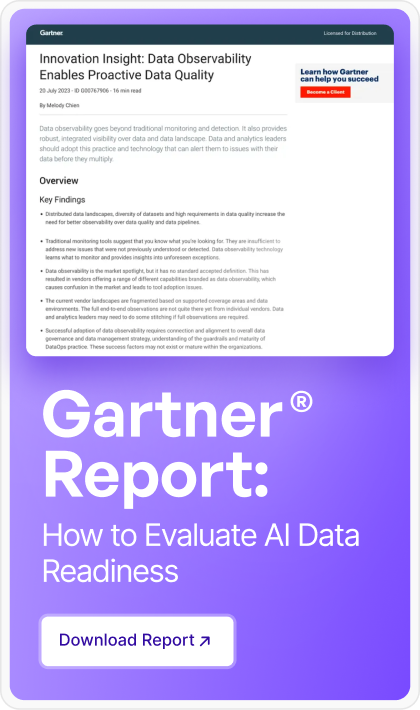Data is the new oil; however, it holds value only if you can extract actionable insights from it. According to a report by Forbes, 93.9% of leading enterprises are increasing their investments in data-driven strategies in order to generate new business value from their data.
Merely collecting data isn't sufficient; medium and large enterprises must unlock its potential to benefit from it fully. According to Forrester, just 20% of non-IT professionals are able to meet their BI requirements, leading to missed opportunities.
So, how do you leverage your data? Through cutting-edge business intelligence software. Investing in the right data tools can enhance business outcomes, improve decision-making, and keep you competitive in an increasingly digital world.
This article highlights the 10 essential features of top BI tools to assist you in selecting the best data solutions for your organization's requirements.
1. Seamless Data Integration for Better Insights
Effective business intelligence software must facilitate seamless integration with various types of sources, encompassing internal and external data sources as well as those based in the cloud and on-premises.
You need to evaluate the data sources currently used in your organization while also considering future integration opportunities. According to Harvard Business Review, enterprises facing disconnection debt spend up to 60% of their working day on tasks involving disconnected systems.
Platforms such as Acceldata excel in integrating structured, unstructured, and streaming data into a unified view, helping you improve overall data observability and reliability. Acceldata also offers business intelligence features that ensure data quality, making it easier to trust.
2. AI-Powered Analytics for Smarter Decision-Making
Artificial intelligence has become increasingly vital in business intelligence software over the last few years.
It's essential to choose modern BI tools that leverage AI and machine learning to prepare your enterprise for the future. These tools should offer capabilities such as predictive analytics, anomaly detection, and trend forecasting.
According to a McKinsey research, AI-powered businesses have the potential to increase productivity by 40% over the next decade.
3. Intuitive Dashboards That Simplify Complex Data
The ability to transform complex data into easily digestible visualizations is a critical business intelligence feature of top BI tools.
As per a research paper published on ResearchGate about role of dashboards in business decision-making, most users consider user-friendly dashboards to be the most important feature in their BI software. Therefore, you should seek tools that provide intuitive visualizations, allowing users at all levels to explore and interact with the data.
Acceldata offers customizable dashboards that allow users to tailor their visualizations to specific business needs. Its Open Data Platform ensures that key metrics are always at the forefront.
Gartner reports that 70% of organizations are planning to shift their focus to leverage available data more effectively.
4. Real-Time Processing for Instant Results
Real-time data access plays a key role in an organization's success in today's fast-paced business environment. According to Forbes, 60% of companies use real-time analytics to improve customer experience across touchpoints and devices.
Businesses must choose top BI tools that can process and analyze data in real time, enabling them to respond immediately to changes.
Acceldata offers robust real-time monitoring of data pipelines that ensure any data quality issues are identified and resolved immediately.
5. Custom Reports Tailored to Your Needs
Businesses have different data consumption preferences; therefore, it is essential to develop custom reports that cater to specific segments. The ability to create custom BI reports enables key stakeholders to obtain the insights they need.
70% of practitioners state that guided analytics is a critical component of self-service BI, according to a report by Dresner Advisory Services.
6. Scalability to Grow Your Business
Scalability is a critical consideration for growing businesses. Your business intelligence software should be able to handle increasing volumes of data and users without compromising performance.
Data overload leads to sluggish performance and decision-making; therefore, the BI software needs to scale seamlessly as your organization grows.
7. Strong Data Governance to Stay Compliant
Data governance has become more important than ever with the enactment of regulations such as GDPR and CCPA. The best business intelligence software should provide comprehensive governance features such as role-based access, data lineage tracking, and audit logs.
Data governance is a sign of trust. Deloitte reports that businesses with strong data governance practices are 2.5 times more likely to experience improved financial performance.
Data governance is a critical part of Acceldata's Data Governance Platform, which offers robust features, allowing organizations to maintain compliance without compromising data quality.
8. Mobile Access for Insights on the go
Mobile-first strategies are transforming how business intelligence is consumed. Most decision-makers access business intelligence software dashboards via mobile devices, which underscores the importance of mobile-optimized dashboards and reports.
9. Collaboration Tools for Better Teamwork
Collaboration is essential for deriving tangible value from data insights. According to Deloitte, companies with strong collaboration capabilities in business intelligence applications are 2.3 times more likely to achieve their business outcomes.
The best BI tools allow users to share reports, annotate insights, and collaborate in real time.
10. Cost-Effective Solutions for Every Business
Cost considerations remain at the forefront of decision-making. According to Gartner, 78% of CFOs plan to boost technology investments, with an expectation that these investments will yield tangible ROI.
The best business intelligence tools provide flexible pricing models and scale according to business needs, ensuring cost-efficiency without compromising on features.
With a transparent pricing structure, Acceldata offers a cost-effective solution tailored to businesses of all sizes, making it an ideal choice for organizations looking to optimize their data management costs.
Unleash the Power of Your Data with Business Intelligence Software
Choosing the right business intelligence software goes beyond just attractive features; it’s about enabling your organization to transform data into meaningful insights. From real-time analytics to scalable architecture, the top features outlined in this article can help you make an informed decision that drives real business value. Before getting the business insights from business intelligence solutions, it is critical to have a continuous monitoring if the business data is reliable. That's where the data observability solutions come to play. There are many solutions to for data observability worldwide. Acceldata is one of the most demanded solutions by enterprises for their data observability operations.
Acceldata provides an all-in-one platform that is designed from the ground up to meet the evolving needs of data-driven organizations. Contact Acceldata now to improve your data stack with cutting-edge observability and business intelligence features.
Summary
Data plays a key role in an organization’s success in today’s highly competitive digital world. However, mere accumulation of data is not enough; businesses need to unlock its potential to make the most of this data.
Effective business intelligence software can transform your business through improved decision-making. The top 10 features of leading BI tools can guide businesses in finding the right data solutions to meet their unique requirements.







.webp)







.webp)
.webp)


